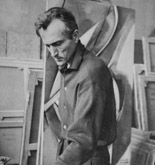
Reynold Arnould’s prodigious talent as a child is comparable to that of Picasso. In recognition of his extraordinary gift Arnould was given an exhibition at the age of nine at Galerie Legrip, Rouen, and the following year he entered the Ecole des Beaux Arts de Rouen; by the age of eighteen he was admitted to the Ecole des Beaux Arts de Paris, where he won the Premier Prix de Rome. Here he also befriended Maurice Denis and Emile Bernard.
Emerging after the war as still a young artist, Arnould was already firmly engaged with the Paris art world. He exhibited at the major avant-garde salons, such as the Salon d’Automne and the Salon des Tuileries, and here under the scrutiny of the public eye, Arnould’s highly accomplished work soon began to attract attention, and particularly that of the influential critic Frank Elgar. In the thriving Parisian atmosphere of the Liberation Arnould’s creativity flourished, and he developed productive friendships with Pignon, Gischia, and Estève. In 1945 Arnould held his first solo show in America, at the Passedoit Gallery, he was rapidly developing an international reputation, and would later exhibit widely in America. His work during this period was of a highly personal semi-abstract figuration, with clear bold shapes of stylised forms, and rich vibrant colours.
His contributions to the radical avant-garde exhibitions at the Salon de Mai between 1949 and 1962 show Arnould’s work becoming increasingly abstracted, and towards 1955 the figurative content became almost entirely unidentifiable as he embarked on an impressive series of works exploring the dynamism in the post-war society. During this period his paintings consisted of powerful lineal gestures, with parallels with the Italian Futurists. These works again received critical acclaim when they were exhibited at the Musée des Arts Décoratifs exhibition “Forces et Rythmns de L’Industrie” in 1959.
Arnould was an astonishingly talented painter, whose successful artistic career lists many high-profile exhibitions around the world, brief examples being: 1945, Galerie Passedoit, New York, USA; 1947, “Quelques Artistes d’Avant Garde” Galerie de Berri; 1948, “Le Prix des Editions du Chene de La Jeune Peinture”, Galerie Drouant-David; 1949, Gimpel Fils, London; Museum of Dublin; Durand-Ruel Gallery, NY; 1950, Texas USA; 1951, Princetown USA; 1952, Galerie Billiet-Caputo, Galerie de France; 1953, Tokyo, Australia, London; 1954, San Fransisco, Oslo; 1955, Biennale de Sao Paolo; Washington; 1956, “Art Français Contemporain”, MOMA San Fransico, Los Angeles, Washington; 195,7 Nuremberg, Germany; 1959, “Forces et Rythmns de l’ Industrie” Musée des Arts Décoratifs, Paris; 1960, Venice Biennale; 1969, Quarante ans de Portraits,1928-1968, Galerie de France; 1983, Retrospective: Grandes Nationale du Grand Palais. To celebrate the artist's centenary in 2019 major exhibitions have been held at the Musée des Beaux Arts in Rouen and the Musée d'Art Moderne in Le Havre; as well as the publication of a new monograph by Francois Vatin and Gwenaele Rot.
The artist is represented in numerous public collections, including the Musée Nationale d’Art Moderne de Paris, and modern art museums in London, America, Italy, Norway, and Switzerland.